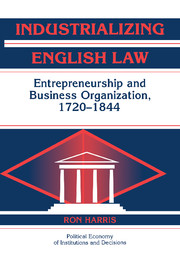Book contents
- Frontmatter
- Contents
- List of Tables
- Acknowledgements
- Introduction
- 1 The Legal Framework
- PART I BEFORE 1720
- PART II 1721–1810
- PART III 1800–1844
- Conclusion
- Appendix 1 The Rise and Decline of the Major Trading Corporations
- Appendix 2: Capital of Joint-Stock Companies Circa 1810
- Bibliography
- Index of Cases
- Index of Statutes
- General Index
1 - The Legal Framework
Published online by Cambridge University Press: 12 August 2009
- Frontmatter
- Contents
- List of Tables
- Acknowledgements
- Introduction
- 1 The Legal Framework
- PART I BEFORE 1720
- PART II 1721–1810
- PART III 1800–1844
- Conclusion
- Appendix 1 The Rise and Decline of the Major Trading Corporations
- Appendix 2: Capital of Joint-Stock Companies Circa 1810
- Bibliography
- Index of Cases
- Index of Statutes
- General Index
Summary
Much of the literature on the history of business organizations is the history of winners. It projects backward from the end of the story. The rise to dominance of the joint-stock limited corporation in the late nineteenth and early twentieth centuries led many historians to focus their attention mostly on this form of organization from as early as the sixteenth and seventeenth centuries. They neglected other forms of organization that did not win the day, assuming that the winning was in some sense inevitable from the outset. I argue that it is impossible to isolate the story of the business corporation from the stories of other forms of organization. Entrepreneurs employing these forms interacted and competed with one another in the commodities and financial markets. Lawyers, judges, and legislators shaping these forms copied features from others, and at times rejected features found to be problematic in relation to other forms. I further argue that the rise to dominance of the business corporation was not inevitable in any sense from the perspective of the year 1500 or even the year 1800. Its rise cannot be comprehended in a narrow context, by unfolding the story of the business corporation in a linear and deterministic manner.
This chapter surveys the legal framework of business organization in early modern England.
- Type
- Chapter
- Information
- Industrializing English LawEntrepreneurship and Business Organization, 1720–1844, pp. 14 - 36Publisher: Cambridge University PressPrint publication year: 2000



